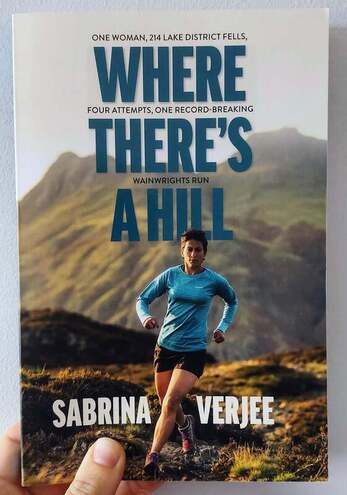
Where There’s a Hill is the story of how Sabrina went from not considering herself ‘a natural athlete’ to becoming the first person to summit all 214 Wainwright peaks in the Lake District in under six days – an incredible achievement.
What I really loved about Where There’s a Hill is how honest and readable it is. It feels more like a relaxed chat with a friend than the autobiography of a record-breaking runner, and it’s easy to forget quite how impressive Sabrina’s accomplishments are.
The narrative starts with a chapter on Sabrina’s childhood and family, then moves quickly on to discuss the career change and house move that gets her up to the Lake District. It’s really fascinating to read about the evolution of her plans for the Wainwrights: what makes her first start considering it, and then how her route and expectations change between each of her attempts. I haven’t spent loads of time in the Lake District so I’m not too familiar with many sections of the route, but there’s a map included and smaller maps of various sections where needed which is really helpful. It’s also got a lovely selection of photos which is great (I am firmly of the opinion that every outdoors narrative book would be improved by a good selection of photos), and helps show how tough the conditions were at times.
I followed Sabrina’s final record-breaking attempt at the time, but I had no idea how much her success on that round was a direct result of building on the failures of previous attempts. Sabrina carefully analyses her route and strategy and mistakes, fine-tuning her plans until everything comes together. When she’s discussing her route, she does have a tendency of flitting from discussing one attempt to a different one quite quickly which I did occasionally find a little confusing, but it didn’t really dilute my enjoyment of the book. I was really impressed throughout by Sabrina’s loud confidence in herself. It’s so rare to see a woman declaring that she’s good at something, that people want her on their team because of her specific strengths; Sabrina’s self-assurance is so refreshing and inspiring! Her determination and willingness to share her journey without glossing over any of the ugly bits stops her from ever coming across as arrogant. She’s open about the tough bits of running ultras and about times when she feels her behaviour has let her down. She’s very self-critical here, apologizing for snapping at friends when running for literally days without a break. She holds herself to a high moral standard, even going as far as to refuse painkillers whilst doing the round. I’ve often wondered where the boundary comes for people accepting support to get themselves around long-distance, record-breaking runs, and I found Sabrina’s strict ethics to be refreshing, if not at times surely more strict than anyone would expect; it’s difficult to imagine anyone criticizing her for taking paracetamol. It's clear throughout how much Sabrina is driven by the sheer joy of running and of exploring the mountains in this way. She is incredibly driven, always aiming for success, but seems more inspired by the delight of moving quickly through the mountains than by the idea of beating anyone else. I am hoping this sense of playfulness in the hills is going to prove good inspiration for my own running, albeit at a rather less impressive level, as the weather turns autumnal over the next few weeks... (With thanks to the lovely folk at Vertebrate Publishing for a free copy in exchange for an honest review.)
0 Comments
Leave a Reply. |
book REVIEWSPredominantly climbing/outdoors literature, mountaineering history and nature writing. Archives
July 2023
Categories
All
|
 RSS Feed
RSS Feed


